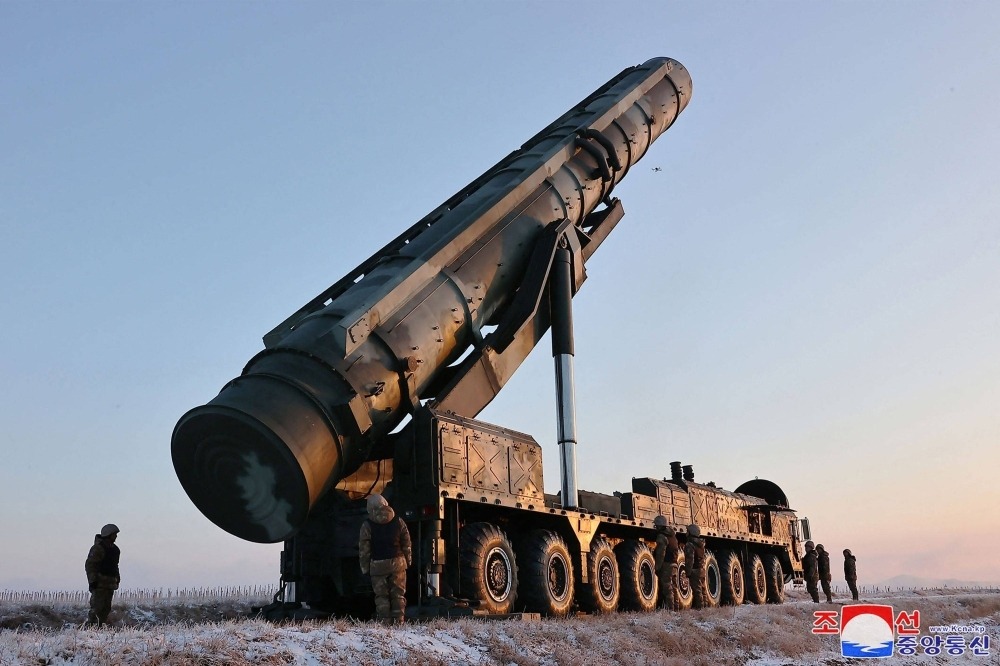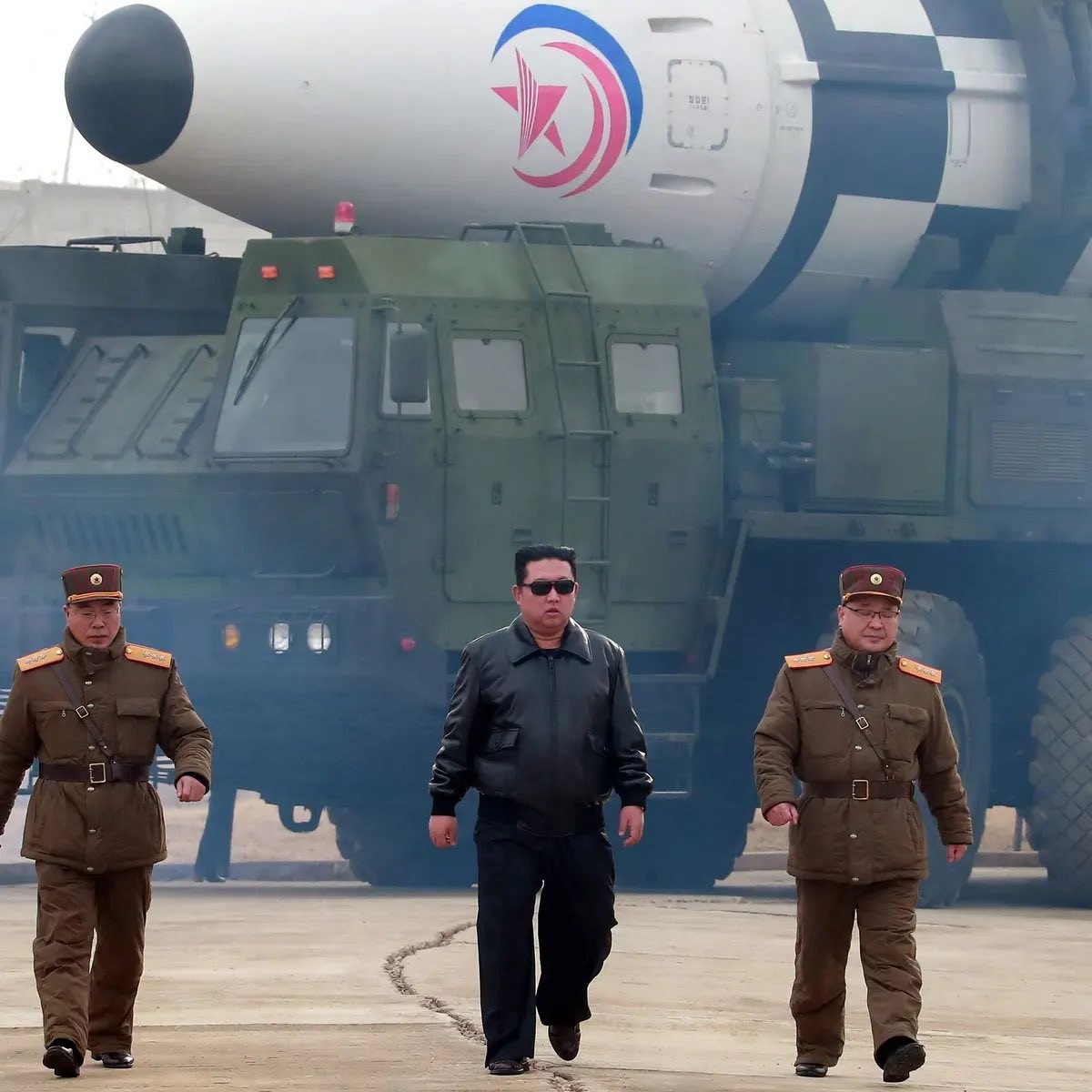In recent developments, North Korea has announced the mobilization of 1.4 million citizens for what it calls a “holy war” to defend the country’s sovereignty under Kim Jong Un’s leadership.
In a statement, North Korea directly threatened South Korea, accusing it of “a serious provocation.” This move comes amidst rising tensions between North and South Korea, raising concerns about potential conflict in the region.
The Korean Central News Agency (KCNA) declared, “Millions of young people have turned out in the nationwide struggle to wipe out the ROK scum who committed a serious provocation of violating the sovereignty of the DPRK through a drone infiltration into its capital city to push the tense situation to “the brink of war.”
North Korea’s Mass Mobilization
KCNA further claimed that over 1.4 million youth volunteered to join or rejoin the Korean People’s Army on 14-15 October. The agency added, “The number of the angry revengers of the rising generation determined to plunge the heinous enemy into an abyss of final ruin continues to grow with the passage of time.”
North Korea further escalated its rhetoric, warning, “If a war breaks out, the ROK [Republic of Korea / South Korea] will be wiped off the map. As it wants a war, we are willing to put an end to its existence”
The KCNA described the youth’s fervor as a manifestation of “deep hatred” and “a desire for revenge,” with young citizens across the country signing petitions to join the military, pledging to hunt down the “heinous confrontation maniacs” responsible for igniting tensions.
Amid ongoing global conflicts like the Russia-Ukraine war (which started in February 2022) and the Israel-Gaza-Iran war began last year in October 2023 in the Middle East. Now, tensions are escalating in Asia, with a potential conflict brewing between North and South Korea, raising global concerns about another war on the horizon.
Kim Jong-Un Preparing for War?
In January, veteran Korea watchers Robert Carlin and Siegfried Hecker warned that North Korean leader Kim Jong-Un might be preparing for war. While this may seem like an exaggeration, their concerns are grounded in serious analysis.
“It may sound overly dramatic,” they wrote, “but we believe that, like his grandfather in 1950, Kim Jong Un has made a strategic decision to go to war. We don’t know when or how Kim will act, but the threat now far surpasses the usual warnings from Washington, Seoul, and Tokyo about Pyongyang’s ‘provocations.’ The war preparation themes we’ve seen in North Korean media since last year are not typical DPRK bluster,” they observed.
Considering North Korea’s recent statements, it’s hard to dismiss their warnings entirely. Defense experts have also highlighted North Korea’s strengthening ties with China and Russia in recent months, further complicating the geopolitical landscape.
North Korea’s Escalating Hostility Toward South
Recently, North Korea has labeled South Korea a “hostile” state. In January, Kim Jong Un referred to Seoul as his country’s “principal enemy,” asserting that North Korea is no longer interested in reunification.

North Korea has accused Seoul of using drones to drop anti-regime propaganda leaflets over the capital, Pyongyang. In retaliation, North Korea has been sending trash-filled balloons across the border since May, responding to activists’ propaganda efforts.
Notably, North Korea itself has dispatched drones southward; in 2022, five of its drones crossed the border, prompting South Korean military forces to fire warning shots and deploy fighter jets, though none of the drones were shot down.
This week, Pyongyang claimed to have “clear evidence” that Seoul’s military was behind recent drone incursions. In response, South Korea’s Joint Chiefs of Staff spokesperson, Lee Sung-jun, stated that this assertion is something North Korea needs to verify.
Following months of laying new mines and enhancing border security, North Korea blew up roads and railways connecting it to South Korea, calling this action “an inevitable and legitimate measure,” according to the official Korean Central News Agency. North Korea destroyed sections of roads on its side of the border that connected it to South Korea.
On October 15, South Korea’s military released video footage showing North Korean soldiers demolishing symbolic roads and railways linking the two Koreas. This destruction occurred just days after Pyongyang’s military vowed to “permanently” seal the border with the South.
Last week, the North Korean military announced plans for a “complete separation” from South Korea, informing US military forces of this move to “prevent any misjudgment or accidental conflict.” They stated that parts of key inter-Korean roads and railways had “been completely blocked through blasting.”
North Korea’s Growing Arsenal
North Korea’s nuclear program remains a significant concern. In January 2021, North Korea’s leadership outlined ambitious plans to expand its nuclear deterrence, including the development of miniaturized nuclear warheads, tactical nuclear weapons, multiple independently targetable reentry vehicles (MIRVs), solid-fuel ballistic missiles of varying ranges, nuclear-powered submarine systems, and hypersonic boost-glide vehicles.

According to a research report by ‘the Royal United Services Institute’ (RUSI), Kim Jong Un has amassed enough weapons-grade nuclear material to more than double his current stockpile of atomic weapons. He is already believed to possess between 80 and 90 nuclear warheads, with sufficient enriched plutonium and uranium—key components known as fissile material—to significantly increase that number.
Fissile material is critical for nuclear weapons, typically requiring several kilograms to trigger the chain reaction that leads to a nuclear explosion. For reference, the 1945 bombings of Hiroshima and Nagasaki were caused by the fission of approximately one kilogram of uranium-235 and plutonium-239, respectively.
Escalating Tensions On The Korean Peninsula
The recent incident involves allegations that drones from Seoul scattered propaganda leaflets over Pyongyang, which North Korea claims violated its “sovereignty” and could escalate to “armed conflict and even war.”
On the other hand, while South Korea has denied responsibility for the drone flights, its Joint Chiefs of Staff later stated they could neither confirm nor deny the allegations, leaving the matter unresolved.
Pyongyang has framed this mass mobilization as a demonstration of national unity, fueled by a commitment to defend the country and retaliate against what it perceives as South Korea’s “aggressive” actions.
As North Korea persists with its actions and rhetoric while simultaneously enhancing its nuclear capabilities, the situation on the Korean Peninsula remains a complex and evolving challenge.
The recent mobilization of citizens in North Korea, the destruction of inter-Korean infrastructure, and escalating hostile rhetoric all point to a worrying trend.
- Shubhangi Palve is a defense and aerospace journalist. Before joining the EurAsian Times, she worked for ET Prime. In this capacity, she focused on covering defense strategies and the defense sector from a financial perspective. She offers over 15 years of extensive experience in the media industry, spanning print, electronic, and online domains.
- Contact the author at shubhapalve (at) gmail.com




